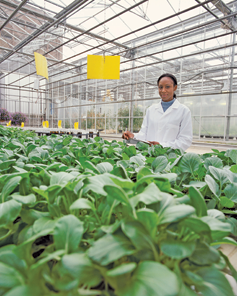The Data Use and Compensation Agreement (DUCA)

PDF of the DUCA and its Appendices
The DUCA℠ has many shared principles and commitments with the GEMAA℠.
The DUCA, much like the GEMAA provides the following basic elements:
- An opportunity for members of the U.S. agricultural value chain to participate in the process and steer the future direction of the agreements
- Notice three years in advance of patent expiration that an even's patent will expire
- An obligation to provide access to the biotechnology event, in a "usable" form at the time of patent expiration
- Mechanisms for sharing or transitioning of regulatory costs and responsibilities through negotiation with binding arbitration, if necessary
- A predictable process for signatories, or groups of signatories, to become "verified" to ensure that they are able to share or take over regulatory responsibilities
- Stewardship requirements for signatories
- A clear path for a signatory exiting the market for an event to 1) transition the responsibility to other signatories interested in maintaining authorizations for an off-patent event; or 2) if there are no signatories interested in taking over an event, an orderly process for discontinuing that event
However, the DUCA provides for an alternate mechanism for data compensation in return for access to proprietary regulatory property (PRP) at patent expiration. Access to PRP is important for companies interested in using off-patent events as a single event product once the original developer exits the market; or if companies wish to create new seed products that combine an off-patent event with other proprietary events. Under either circumstance, companies would need access to the original PRP or may otherwise create their own, which can both costly and time consuming. Under the DUCA, access to PRP and data compensation is mandatory.
KEY ELEMENTS OF THE DUCA
- Communication: Both AgAccord agreements encourage communication among signatories and with the value chain. The GEMAA and DUCA were designed with the intention of enabling broad participation, including biotechnology companies, seed companies, universities and national farmer organizations, so that key members of the value chain are kept informed of developments related to patent expiration.
- Transparency: Facilitation of information among stakeholders is a core component of the AgAccord. Much like the GEMAA, the DUCA creates obligations around providing a series of "notices", including initial notice, which requires signatories to inform the public no later than three years before expiration, that the last patent covering a commercial event will expire.
- Predictable Timelines: The DUCA outlines a series of important deadlines to ensure that milestones within the DUCA process are met. This provides necessary predictability throughout the DUCA process. For example, the DUCA specifies the timeframe for negotiations and arbitration of an event-specific comprehensive agreement so that signatories have confidence that negotiations for access to an event and its PRP will conclude in a timely manner.
- Pre-patent access: Both AgAccord agreements include a requirement for Signatories with events coming off-patent, upon the request of another signatory, to enter into good faith negotiations for access to the event and PRP prior to patent expiration. However, it is not required that an agreement for pre-patent access be executed if the parties do not reach agreement on terms.
- Access to Off-Patent Events in a Suitable Form: Like the GEMAA, the DUCA also requires that signatories will provide access to the event in a suitable form (meaning without associated intellectual property restrictions) to other DUCA signatories that execute an event-specific comprehensive agreement.
- Objective Verification: The DUCA requires each signatory to be "verified" in order to join negotiation of an event-specific comprehensive agreement. Signatories interested in becoming verified must establish their ability to steward events (individually), and together with other signatories seeking to become verified must identify a single party (operator) to provide regulatory services for an event; and establish a verification fund that will constitute the negotiating parties' financial wherewithal to share in or take over global regulatory responsibility for an event.
- Negotiation and Arbitration: The DUCA is structured to enable all verified signatories to enter into negotiation of a comprehensive agreement on an event-by-event basis. Each event-specific comprehensive agreement will detail the level of data compensation for access to PRP as well as establish the regulatory and stewardship responsibilities that must be maintained when marketing an off-patent event. Parties negotiating an event-specific comprehensive agreement have the flexibility to determine the terms and conditions of each comprehensive agreement. However, if parties negotiating a comprehensive agreement cannot reach agreement within two years of initial notice, all unresolved issues will go to binding arbitration. The signatory that is the PRP Holder is required to execute the resulting event-specific comprehensive agreement, unless no other negotiating party executes that comprehensive agreement.
- Compensation: Each signatory that gains access to an event through a comprehensive agreement is required to pay a share of basic regulatory costs (BRC) and continuing maintenance costs (CMC). BRC compensates the PRP Holder for the current replacement costs of the relevant PRP submitted to regulatory authorities through patent expiration. BRC will be depreciated for those signatories accessing PRP for use only as a single event. CMC are the actual costs of maintaining and obtaining new authorizations and paying the Operator for regulatory services under an event-specific comprehensive agreement. The PRP Holder is also responsible for a share of BRC and CMC if still commercializing seeds containing the event.
- Combined Event Seed Products (Stacks): The DUCA establishes a standard set of rights and obligations for signatories interested in creating proprietary combined event seed products containing an off-patent event covered under the DUCA. Signatories that create combined event seed products that contain only generic events will pay compensation based only on the single events accessed through the DUCA, unless that combined event seed product becomes patented.
